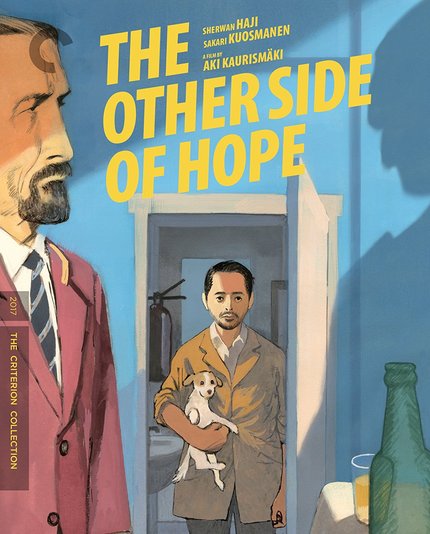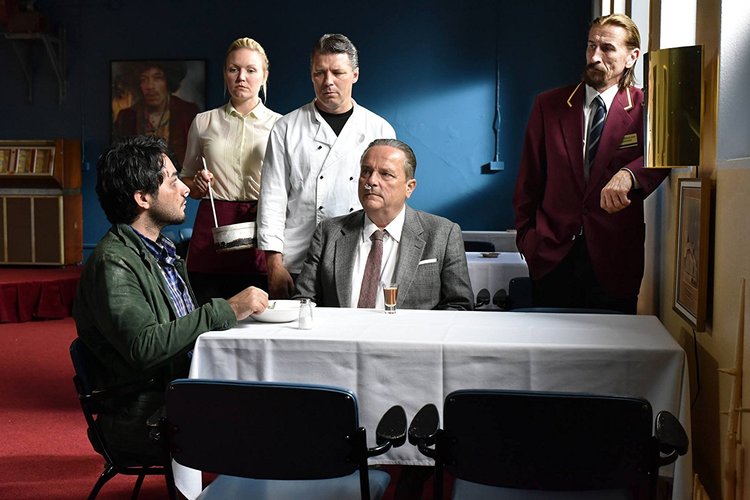Blu-ray Review: THE OTHER SIDE OF HOPE Explored via Criterion
Finnish auteur Aki Kaurismäki's award winning comedy-drama of immigration troubles arrives on Blu-ray.

Refugees travel lightly, but we can unpack this: What is “the other side of hope,” anyway? Some say it’s despair; others more cynically say it’s truth. But what they mean with those answers are “opposite,” which is not necessarily the same as “the other side.”
The latest production from Finland’s greatest auteur, Aki Kaurismäki, is being singled as one of his best. It bears the thoughtful title, “The Other Side of Hope” (Toivon Tuolla Puolen). As the second part of a self-prescribed “Immigration Trilogy,” Kaurismäki isn’t so much interested in wallowing in despair of the contemporary immigrant experience, as difficult as that experience all too often is.
Rather, the filmmaker takes us, tonally speaking, around to the backside of the issue: the dingy, once-ignored “backstage area” of the gleaming outward Hope! that motivates national transplants. It’s into the filthy, neglected storage room and janitor closets where they end up, metaphorically and literally; amid the empty metal shelves and dust-bunnies.
The Other Side of Hope affirms that Kaurismäki’s trademark blend of odd, sardonic wit, chronic expressionlessness and outsiders buckling against a stacked-deck system is alive and well, decades into his notable career. The film tracks two men. One, Wikström (Sakari Kuosmanen), an older shirt wholesaler of Finland who’s decision to walk out on his chain smoking wife has him selling his stock below cost, out of the trunk of his car. He then buys a crappy restaurant called “The Golden Pint,” fully equipped with a few disgruntled employees and a juke box that aspires to Happy Days.
In truth, the whole restaurant looks like something out of a 1970’s sit-com, or even SCTV. Decor and ambiance does wonders to reveal whether any particular real dining establishments is in fact a bonafide restaurant, or merely a place that’s trying to be a restaurant. Whether the disparaging state of The Golden Pint, where so much of the movie takes place, is fully intentional or, at least, somewhat the victim of an obviously humble budget, one can’t pinpoint. But one thing is for certain, the place never stops being sadly hilarious.
Anyhow, the immigrant in question in The Other Side of Hope is a young Syrian man named Khaled, portrayed by big-screen newcomer Sherwan Haji. Khaled, in the first shot of the film, emerges from a load of coal at night, not completely unlike John Goodman emerging from the pavement in Raising Arizona. It’s on a barge, which just docked in town. Once he’s cleaned up, it’s off to the police station to turn himself in for asylum. His village in Aleppo had come under fire, the violence claiming the lives of everyone in his family except for his sister, whom he can’t locate.
Anyhow- his reason for fleeing? Not good enough for Finnish authorities. Khaled is instructed to report for deportation back to his homeland. Instead, he runs, and ends up employed at The Golden Pint. Also, with Wikström’s help, he ends up living at The Golden Pint, in the back room, amid the empty metal shelves and dust-bunnies. And in this case, the odd food service-sized can of sauce, pickles, or whatever else. Each morning he rolls up and stashes his bedding, puts on an apron, and goes to work. He is never not worried about his sister, wherever she may be.
Sherwan Haji, with his cooled lack of expression, is a most welcome lead to The Other Side of Hope, even as his character most decidedly isn’t welcome in Finland. A fellow Syrian refugee instructs Khaled to keep up a pleasant front, just as women the world over are traditionally taught to always be smiling on the outside. “The melancholy ones are the first ones they send back”, he informs. Khaled’s presence can never be about honest human emotion or, heaven forbid, need. His very security rests in embodying an affirmation- and absolutely not an unpleasant burden to the local populace.
If lead actor Haji’s has more outward range, he could become a real star. In any case, he’s got what it takes to be a Kaurismäki star. Like the director’s world, he’s a beguiling concoction of blankness and empathy, with a good side dose of steel guitar rockabilly and a funny looking dog or two. Is the empathy wrapped in blankness, or is the blankness wrapped in empathy? And how does the sardonic wit get mixed in so effortlessly? That is Kaurismäki’s talent- not losing the gravity of any given situation while also not losing sight of life’s ever present amusing quirks- and never shorting his audience one for the other. The appreciation of this is the key to Kaurismäki Land.
With this film, it’s impossible to ignore just how topical the subject matter is. Inside of Kaurismäki’s trademark sardonic deadpan observations and characters, we find despondency and barbed social critique of his homeland. In this case, he’s targeting Finland’s immigration policies, and that of much of the civilized world.
He communicates that when an entity that is secure in any level of affluence and/or political stability declines reasonable sanctuary to those who need it, the message is clear: “We do not want you. We do not care about you. We are only going through the motions of immigration because we have to. You are nothing but a burden.” The more affluent the country, the more inhumane this can be. Unfortunately, as anyone who follows true life events both current and recent knows, the terrible reality is that such responses are widespread. Whatever the legal/policy history of such stances are (and they seem to be harshly tightening the world over), and whatever other justification is espoused for turning one’s back, the received message is simply the same: dehumanization. And if the system won’t successfully weed you out, maybe some local roving thugs will. Such is the case with Khaled, at one point.
Criterion’s new Blu-ray of The Other Side of Hope is a fine release, serving up a fine, if not overwhelming array of supplemental material. A fifteen minute video interview with Sherwan Haji is nice if not particularly revelatory. Several music videos by the assorted musicians that perform throughout the movie are included, as well as the trailer. There’s also thirty minutes of footage from the press conference for the film’s premiere at the 2017 Berlin International Film Festival, featuring Kaurismäki, Haji, and Sakari Kuosmanen. While it’s fun to watch Kaurismäki’s stone faced and self-deprecating replies, these festival Q&A supplements are crapshoots, and minute to minute, this one is frankly no exception. Unless a film’s press conference is somehow significant to its overall meta-story, such inclusions on a disc can and do feel like endurance tests; easy “added value” padding.
The best bonus feature is a short video essay entitled “Aki and Peter”, by Daniel Raim. Built upon an essay by late film critic and historian Peter von Bagh, the piece focuses on Kaurismäki’s styles, insights and through-lines found in his “Proletariate Trilogy” (Shadows in Paradise, Ariel, and The Match Factory Girl). Seeing the film clips organized thusly and discussed so effectively make one which that Criterion hadn’t relegated these three films to an Eclipse DVD set. (They are readily available in standard definition as Eclipse Series 12: Aki Kaurismäki’s Proletariat Trilogy, which is far and away better than nothing). But more than that, it celebrates the rare friendship bond between a critic and filmmaker. Von Bagh wrote a book about Kaurismäki; Kaurismäki has dedicated The Other Side of Hope to von Bagh.
Delivered from a place of indignation, but not righteous indignation, The Other Side of Hope is refreshing in its own ways. The film is deadpan, but never dead. These are vital distinctions for the filmography of Aki Kaurismäki as he most effectively takes us, unforgettably, around to what is, for many of us, the other side of humanity. But he does it without forcibly dragging us there.
The Other Side of Hope
Director(s)
- Aki Kaurismäki
Writer(s)
- Aki Kaurismäki
Cast
- Ville Virtanen
- Kati Outinen
- Dome Karukoski
- Tommi Korpela








